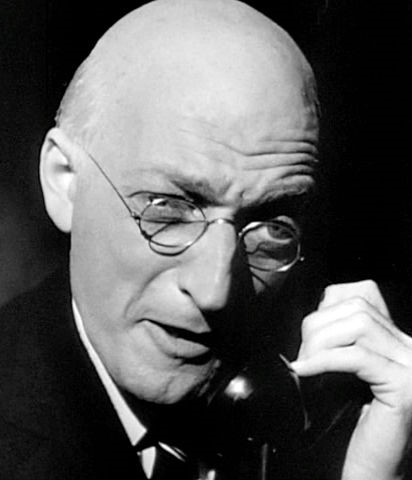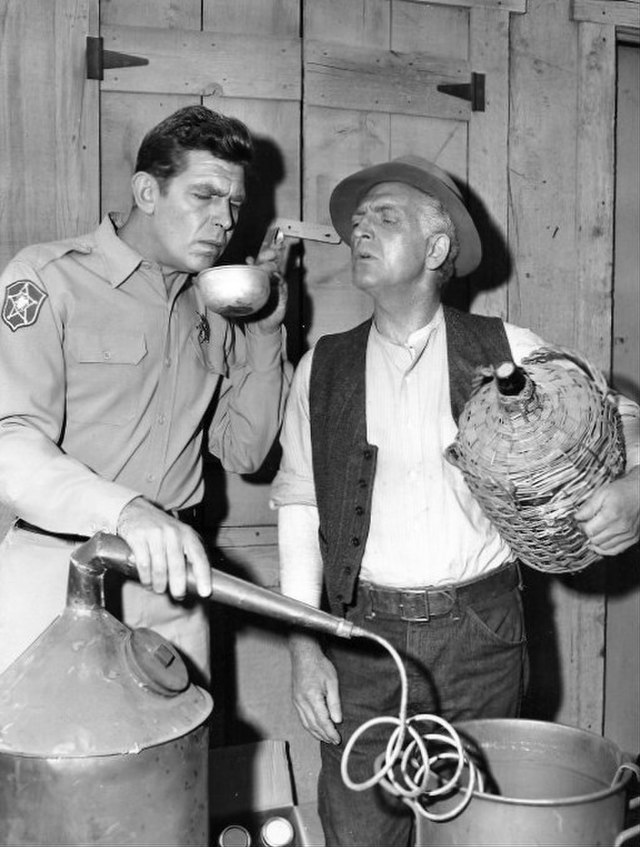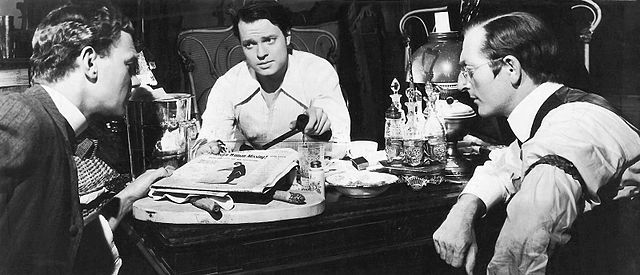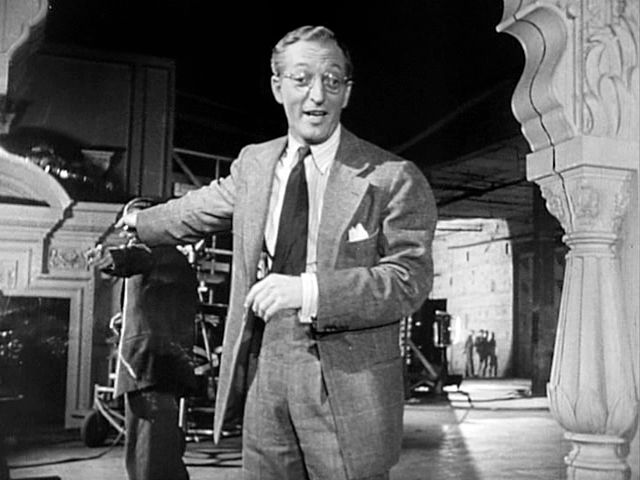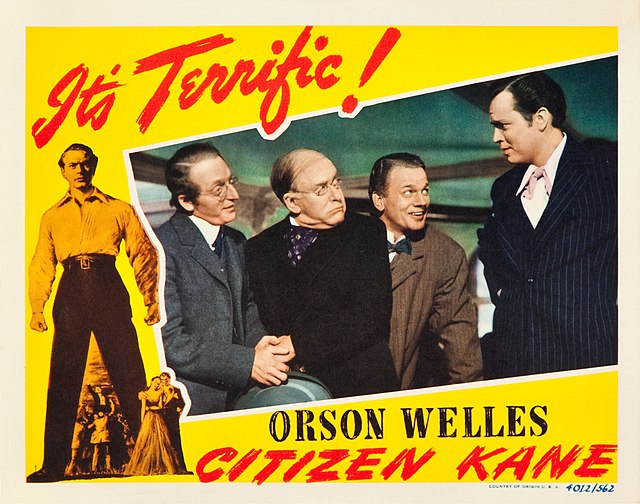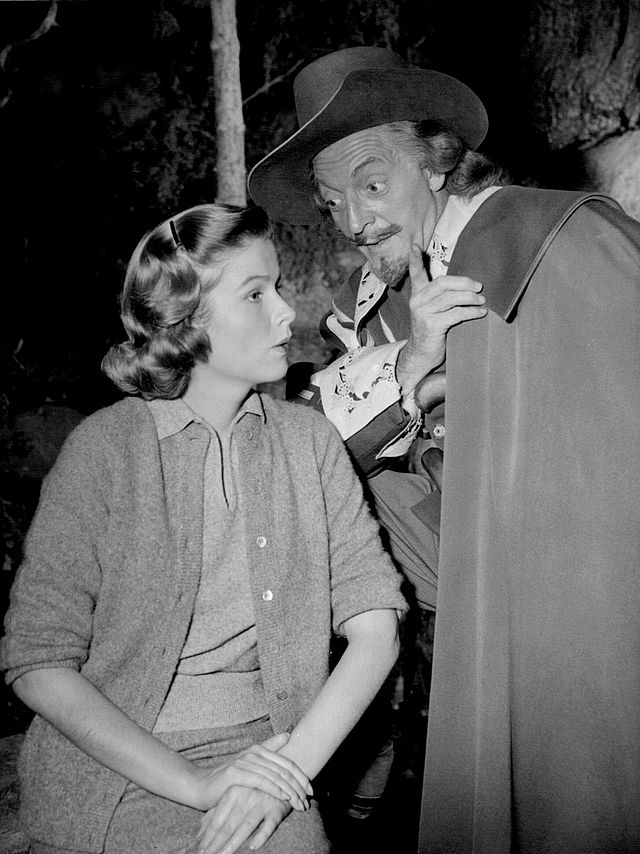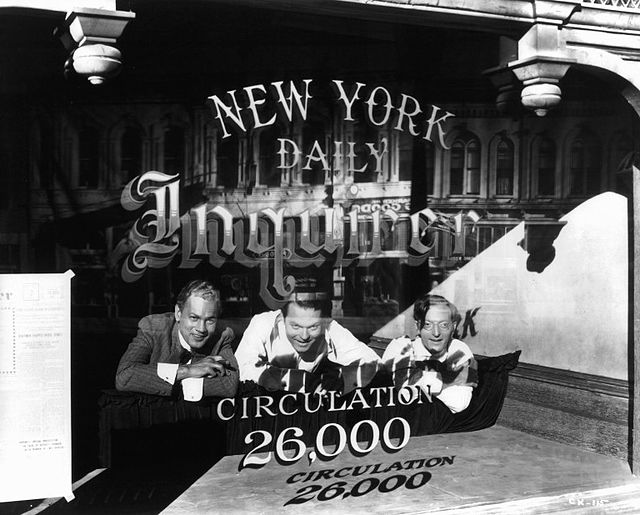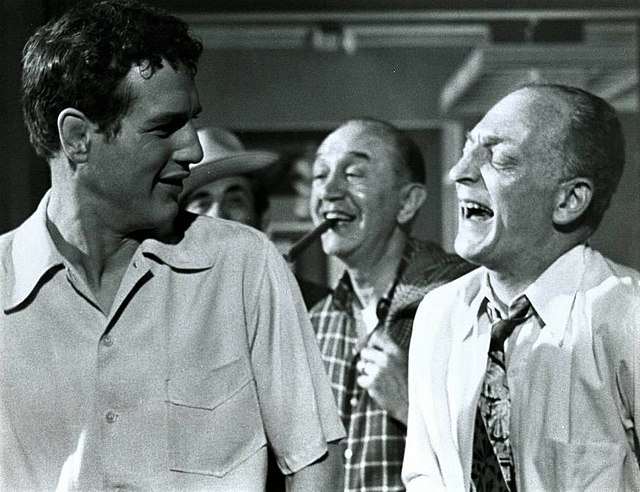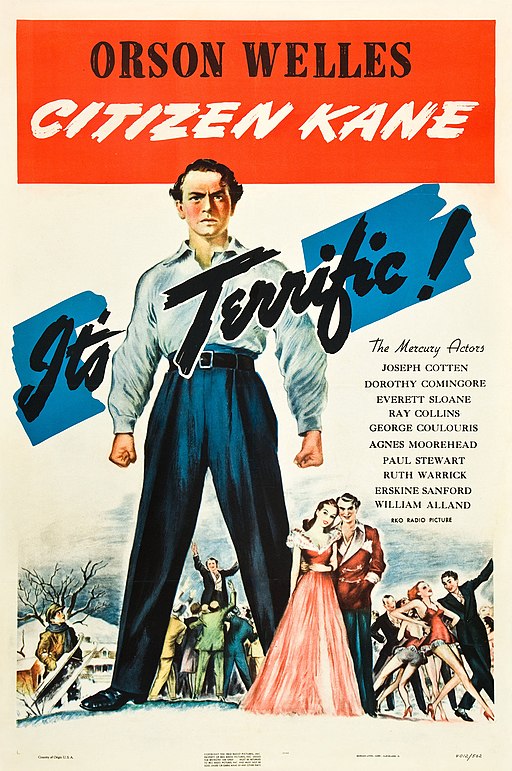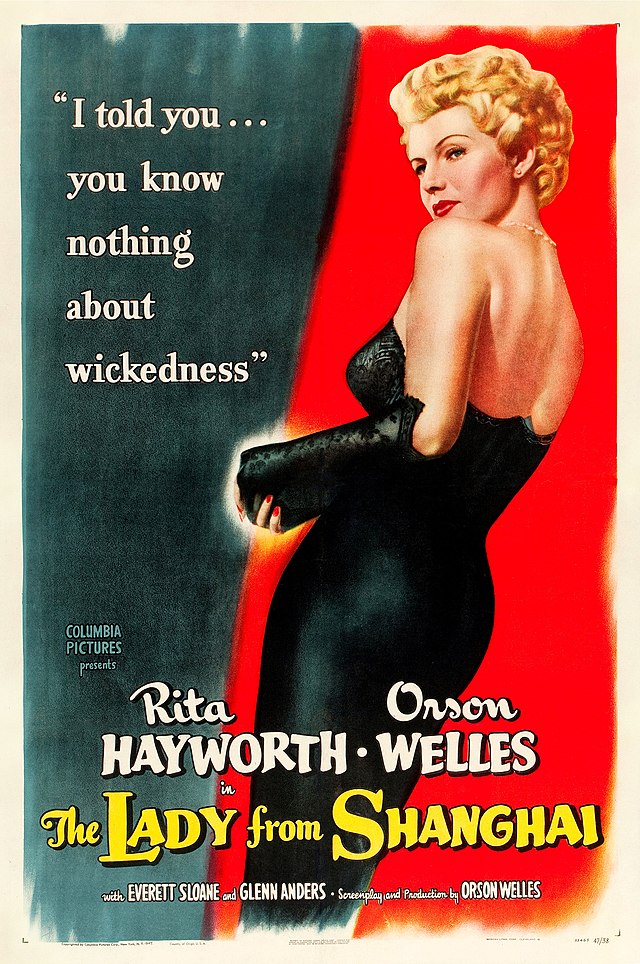Everett Sloane
back| Full Name | Everett H. Sloane |
| Stage Name | Everett Sloane |
| Born | October 1, 1909 |
| Birthplace | Manhattan, New York City, New York, U.S. |
| Died | August 6, 1965 |
| Buried | Cremated, ashes scattered in the Pacific Ocean |
| Married to | Lillian (Herman) Sloane (m. 1933–1965, until his death) |
| Children | 2 children (Stephanie Sloane and Nathaniel Sloane) |
| Notable films | Citizen Kane (1941) - The LAdy from Shanghai (1947) - Journey into Fear (1943) - The Men (1950) |
Everett Sloane
The Quiet Craftsman of Classic Hollywood
Everett Sloane (1909–1965) was an American actor known for his work in radio, film, and television. Born in New York City, he began his career on stage and radio, joining Orson Welles' Mercury Theatre, where he contributed to the legendary War of the Worlds broadcast.
His film debut in Citizen Kane (1941) as Mr. Bernstein became one of his most celebrated roles. Sloane continued working with Welles in films like The Lady from Shanghai (1947), playing complex, morally ambiguous characters.
Related
Everett Sloane (1909 – 1965)
Biography ad Movie Career
Everett H. Sloane was born on October 1, 1909, in Manhattan, New York City. Raised in a Jewish family, Sloane displayed an early interest in performance. As a young boy, he showed a keen interest in acting and theater, participating in various school plays and performances at the local YMCA. Sloane attended the University of Pennsylvania but left after his first year, driven by a determination to pursue a career in the performing arts.
In his early twenties, Sloane initially strayed from acting and took a job in advertising to make ends meet. He worked as a radio advertising writer, but his passion for acting eventually resurfaced, drawing him back to the stage and radio, where his unique voice and presence found a welcoming platform.
Path Toward Success:
Sloane's major break came in 1935 when he joined Orson Welles' Mercury Theatre. He became one of Welles' most reliable collaborators, participating in their groundbreaking radio performances. One of the most notable radio productions was the infamous 1938 broadcast of "The War of the Worlds", which caused nationwide panic with its realistic depiction of a Martian invasion. This broadcast solidified Sloane's position as a trusted member of the Mercury Theatre and a significant figure in radio drama.
When Orson Welles transitioned from radio to film, Sloane followed. His debut on the big screen came in Welles' legendary film Citizen Kane (1941). Sloane portrayed Mr. Bernstein, the loyal, soft-spoken, and sentimental business manager of the title character, Charles Foster Kane. Though it was his first film role, Sloane’s performance was met with critical acclaim, and the film itself became one of the greatest in cinematic history. This role marked Sloane's entrance into Hollywood, setting the stage for a versatile career.
Following Citizen Kane, Sloane became a reliable character actor, often playing authoritative, cynical, or sinister roles in a variety of genres. In Journey Into Fear (1943), Sloane portrayed Kopeikin, a comically sinister character, again working alongside Welles. His talents were further displayed in The Lady from Shanghai (1947), where he portrayed Arthur Bannister, a complex and manipulative lawyer. His unique, gravelly voice and his ability to play morally ambiguous or villainous characters made him a go-to actor in films of the era.
Sloane’s career spanned various genres, from film noir to drama, and included films like Prince of Foxes (1949), The Men (1950), and Somebody Up There Likes Me (1956). He was known for his dedication to his roles and for his ability to bring depth to supporting characters.
Personal Life and Passions:
Off-screen, Sloane was married to Lillian Herman, a stage actress, in 1933, and the two remained together for the rest of his life. They had two children, Stephanie Sloane and Nathaniel Sloane. His marriage to Lillian was relatively private, and while Sloane was a serious, studious man, his family life was stable and supportive. Lillian, who had her own artistic career, often stood by Sloane during his highs and lows in Hollywood and beyond.
Apart from acting, Sloane had a passion for music, particularly songwriting. He wrote songs for the musical comedy Frankie and Johnny in the 1950s. Though not widely remembered for his musical work, Sloane found joy and expression through this creative outlet.
Television and Radio Career:
As his film career continued to evolve, Sloane expanded into the world of television, which was experiencing a golden age in the 1950s. He appeared in a variety of TV shows, becoming a familiar face to audiences of the time. Notable television appearances included roles on The Twilight Zone, Alfred Hitchcock Presents, and Perry Mason. His rich voice also kept him in high demand for radio and voice acting, with radio credits on programs like Suspense and The Shadow. Sloane had a commanding presence both visually and aurally, contributing to his long career on both radio and TV.
In the early 1960s, Sloane transitioned into voice acting for animated series, which included work on The Dick Tracy Show. His skill at modulating his voice to suit different characters made him highly sought-after for such roles, and his voice acting work is remembered by fans of early animation.
Struggles and Tragic Death:
Despite his successes, Everett Sloane faced personal struggles as he aged. His later years were overshadowed by deteriorating health, particularly concerns over his eyesight. Sloane was diagnosed with progressive blindness, which profoundly affected his sense of purpose and identity. Acting, a profession that had sustained his career for decades, became increasingly difficult as his vision worsened.
Sloane had long battled bouts of depression, and the prospect of losing his sight pushed him into a deeper emotional decline. On August 6, 1965, at the age of 55, Everett Sloane took his own life by an overdose of barbiturates in Los Angeles. His suicide was linked to his fears of blindness and his inability to cope with the idea of losing his independence and profession.
In the wake of his death, Sloane’s contribution to the arts, particularly his work with Orson Welles and his indelible performances on both stage and screen, were widely acknowledged. He was cremated, and his ashes were scattered in the Pacific Ocean, marking the end of a complex and deeply talented artist.
Legacy:
Everett Sloane's legacy rests in his versatility as a character actor who, although not often a leading man, always elevated the projects he worked on with his distinctive presence and voice. His work in Citizen Kane remains his most celebrated role, but his impact extended far beyond that film. His contributions to radio, television, and film reflect a long career shaped by talent, perseverance, and passion.
Though his life ended tragically, Everett Sloane remains remembered as one of the most skillful character actors of his time. His performances continue to be admired by film enthusiasts, especially those interested in the early works of Orson Welles and the Golden Age of Hollywood.
A Tribute to Everett Sloane
Intense Acting Style of Everett Sloane
Everett Sloane's acting style was marked by a unique blend of intensity, intelligence, and versatility, making him one of the most reliable and skilled character actors of his era. Though he was rarely the leading man, Sloane’s performances consistently elevated the films and shows in which he appeared, due in large part to his ability to embody complex characters with distinct, sometimes contradictory traits. His style was shaped by his early training in radio and theater, as well as his association with Orson Welles' Mercury Theatre, where Sloane honed his craft in an environment that prioritized innovation and artistic rigor.
Voice as a Signature Tool
One of the most striking aspects of Sloane’s acting was his powerful voice. His work in radio trained him to convey emotion, authority, and nuance through vocal inflection alone. Whether playing a scheming villain or a sympathetic character, Sloane’s voice had an inherent gravitas. It was gravelly and commanding, yet capable of expressing vulnerability when the role required. This vocal control allowed him to excel in both radio and television, making him a favored choice for narration and voice work, as well as dialogue-heavy roles. His voice was not just a physical tool; it was an extension of his characters' inner lives, expressing their ambitions, fears, and manipulations with precision.
Mastery of Character Actor Craft
Sloane was known for his ability to inhabit a wide variety of supporting characters, each with distinct motivations and emotional depths. Rather than sticking to a singular type, he had an uncanny ability to adapt to different genres, moving fluidly between film noir, drama, historical epics, and comedies. Whether playing a loyal confidante like Mr. Bernstein in Citizen Kane, or the cunning and morally ambiguous lawyer Arthur Bannister in The Lady from Shanghai, Sloane imbued his roles with subtle complexities. Even when the script presented a straightforward character, Sloane would often bring an underlying edge or hidden depth to the role, making it feel more three-dimensional.
His ability to convey layered emotions made him an actor directors could rely on to add nuance to their projects. In Citizen Kane, for example, Sloane's portrayal of Mr. Bernstein is quiet yet deeply resonant. Through his restrained performance, he reveals a man who is more than just a devoted employee; Bernstein is a character who observes the rise and fall of Kane with a mix of admiration, loyalty, and quiet sadness. His famous monologue about a fleeting glimpse of a girl on a ferry decades earlier is a masterclass in understated, emotionally rich storytelling, illustrating how Sloane used subtlety to deepen his characters.
Ability to Convey Ambiguity
Sloane had a gift for portraying morally ambiguous characters. In film noir, where good and evil are often blurred, Sloane thrived. His portrayal of Arthur Bannister in The Lady from Shanghai is one such example. Bannister is a brilliant yet crippled lawyer, manipulative and calculating, whose true motives are always veiled in suspicion. Sloane’s performance is filled with contradictions: Bannister is simultaneously weak and powerful, outwardly detached yet simmering with malice beneath the surface. This complexity allowed Sloane to keep audiences guessing about his character’s true intentions.
Sloane’s facial expressions also played a critical role in this ambiguity. He could switch between warmth and menace with a subtle narrowing of the eyes or a slight shift in posture. These small details gave his performances a depth that made his characters feel unpredictable, a trait that suited noir and crime dramas perfectly. The tension he could create in a scene came from his ability to manipulate his physicality and voice to play with an audience’s expectations.
Reserved Physicality
Unlike more physically expressive actors, Sloane often relied on a measured, restrained physicality to convey his characters' emotional states. This minimalist approach allowed him to dominate scenes with a simple glance, a furrowed brow, or a slow, deliberate movement. His characters often exuded a calm authority or quiet menace, which made them feel grounded and realistic. For example, in The Enforcer (1951), where he plays a crime boss, Sloane commands the screen with little more than his piercing gaze and composed posture, suggesting power and control with minimal action. His movements were economical, rarely overstated, and this restraint gave his characters an air of calm intellect or hidden menace.
Emotional Intensity Beneath the Surface
Sloane’s roles often required him to portray characters who repressed their emotions, but he did so in a way that still allowed the audience to sense the emotional turmoil beneath the surface. He had an innate ability to let just enough emotion seep through to make the audience aware of the internal struggle his character might be facing, without fully revealing it. This emotional complexity is especially evident in his role as Dr. Brock in The Men (1950), where he plays a sympathetic but detached doctor trying to help paralyzed veterans adjust to civilian life. Though his character is professional and restrained, Sloane’s performance hints at deeper compassion and frustration, showing the audience that this is a man quietly grappling with the limits of his ability to heal.
A Skill for Tragic Figures
Sloane often excelled at portraying characters who were, in some way, tragic. Whether they were morally compromised, physically debilitated, or emotionally scarred, his characters frequently carried the weight of personal loss or failure. He had a talent for making even unsympathetic characters relatable by giving them a sense of inner conflict. His portrayal of Dr. Gachet in Lust for Life (1956) offers a brief yet poignant example of this. Though the role was uncredited, Sloane's subtle performance conveyed both the doctor's concern for Vincent van Gogh and his recognition of his own limitations in helping the troubled artist.
This affinity for tragedy extended into his voice work. Sloane was able to infuse his voice with a sense of melancholy or bitterness, giving even his animated roles a weight beyond mere cartoonish antics.
An Intellectual Approach to Acting
Sloane approached acting with an intellectual rigor, often delving deep into the psychology of his characters. He was known for being thoughtful and methodical in his preparation, always seeking to understand the motivations driving his roles. This intellectual approach gave his performances a depth and clarity that few character actors of his time could match. He understood the importance of subtext and used it to inform even the smallest gestures or line deliveries. His collaboration with directors like Orson Welles benefited from this detail-oriented mindset, as Sloane was able to elevate secondary roles into essential elements of the story.
Everett Sloane's acting style can best be described as controlled, layered, and intellectually nuanced. He was a master of subtlety, capable of transforming seemingly minor roles into richly complex characters. His voice was one of his greatest assets, allowing him to add gravitas, warmth, or menace to any performance. With his ability to play morally ambiguous figures, tragic characters, and authoritative roles, Sloane cemented his place as one of the most reliable and respected character actors of his generation. His contributions to classic films and television, marked by an economy of physicality and emotional depth, have left an indelible mark on American cinema.
Memorable Quotes from Films:
- From Citizen Kane (1941) – Mr. Bernstein:
"A fellow will remember a lot of things you wouldn’t think he’d remember. You take me. One day, back in 1896, I was crossing over to Jersey on the ferry. And as we pulled out, there was another ferry pulling in. And on it, there was a girl waiting to get off. A white dress she had on. She was carrying a white parasol. I only saw her for one second. She didn’t see me at all. But I’ll bet a month hasn’t gone by since that I haven’t thought of that girl."
This quiet, nostalgic monologue showcases Mr. Bernstein's sentimental nature and is one of the most iconic lines from Citizen Kane, capturing the theme of memory and the fleeting nature of happiness.
- From The Lady from Shanghai (1947) – Arthur Bannister:
"Killing you is killing myself. But, you know, I’m pretty tired of both of us."
This line is spoken by Arthur Bannister in the climactic scenes of The Lady from Shanghai. It perfectly encapsulates the complex, destructive relationship between Bannister and his wife, and the noir sensibility of existential despair.
- From The Men (1950) – Dr. Brock:
"You know, it’s a funny thing. Men get knocked down, and they stay down. Women get knocked down, and they bounce."
As Dr. Brock, Sloane delivers this line as part of his efforts to motivate the war veterans he’s treating. It reflects his character’s understanding of resilience and human nature.
Quotes from Everett Sloane (Off-screen):
- On working with Orson Welles:
"Welles taught me everything I know. I’ll never forget the feeling of freedom he gave us on the set."
This quote reflects Sloane’s deep admiration for Orson Welles, who played a key role in shaping his career. Sloane often credited Welles for providing him with some of his most significant opportunities, including his role in Citizen Kane.
- On acting:
"Acting is not about grand gestures or big speeches. It's about small truths that make a character real."
Sloane believed in a subtle, nuanced approach to acting, something evident in his performances. He favored intellectual depth and inner conflict over flashy performances, which made his characters feel more authentic.
- On his fear of blindness:
"I could face anything, but not blindness. I can't act without my eyes. They tell the story better than words ever can."
This deeply personal statement reveals Sloane’s struggles with the fear of going blind, a condition that haunted him in his later years and contributed to his tragic suicide in 1965.
Notable Quotes from Television:
- From Patterns (1955) – Walter Ramsey:
"It's not enough to succeed. Others must fail."
Sloane's character, Walter Ramsey, embodies corporate ruthlessness in Patterns, and this line is one of his most iconic. It epitomizes the cutthroat nature of business and the cynical philosophy that Ramsey lives by.
From Radio:
- From The Shadow (as part of the Mercury Theatre on the Air):
"Who knows what evil lurks in the hearts of men? The Shadow knows!"
While this line is more famously associated with Orson Welles, Sloane was part of the cast of The Shadow, and this catchphrase was emblematic of the radio noir genre in which he thrived.
Awards and Recognition
Everett Sloane, while highly regarded as a versatile and talented character actor, did not receive a significant number of mainstream awards during his career. Much of his recognition came from the industry’s appreciation for his craft rather than from formal awards ceremonies.
Primetime Emmy Award Nomination:
- 1955: Nominated for an Emmy Award in the category of Best Actor in a Single Performance for his role in the television play "Patterns", which aired on Kraft Television Theatre. Written by Rod Serling, Patterns was one of the defining TV dramas of the 1950s, and Sloane’s performance as the ruthless businessman Walter Ramsey garnered critical acclaim. The role solidified his reputation as a powerful performer, capable of delivering emotionally complex characters.
Critical Recognition:
Sloane may not have collected many mainstream awards, but his work earned him significant respect from critics, his peers, and directors in the industry. His association with Orson Welles and his standout roles in some of cinema's most important films, such as Citizen Kane and The Lady from Shanghai, led to his being regarded as one of the most reliable and skilled character actors of his time.
- Praise for "Citizen Kane" (1941): His portrayal of Mr. Bernstein in Citizen Kane was widely praised by critics, even though Welles, who directed and starred in the film, received much of the acclaim. Sloane’s performance as the loyal business manager remains one of his most celebrated roles, and it contributed to the film’s status as a landmark in cinema history.
- Recognition for "Patterns" (1955): Sloane's performance in Patterns was a watershed moment in his career. The teleplay became one of the most successful television dramas of its time, and Sloane’s portrayal of the cold, calculating businessman resonated deeply with both audiences and critics. The Emmy nomination that followed confirmed his standing as one of television’s finest actors of the era.
Industry Recognition:
- Respected Collaborator with Orson Welles: Sloane’s association with Welles and his involvement with the Mercury Theatre gave him a reputation as a dependable and talented actor. Welles valued Sloane for his adaptability and professionalism, casting him in several of his productions, including Citizen Kane, Journey into Fear, and The Lady from Shanghai. Welles himself often praised Sloane for his work ethic and versatility, which helped him stand out among his contemporaries.
- Praise for Versatility in Television: By the late 1950s, Sloane had made a significant impact on television, earning recognition for his guest appearances on popular shows such as The Twilight Zone, Alfred Hitchcock Presents, and Perry Mason. He became known for his ability to bring a wide range of characters to life in different genres, from crime dramas to psychological thrillers. His performances consistently drew praise from directors and producers, who valued his ability to deliver emotionally complex characters in short formats.
Posthumous Recognition:
- Legacy in Radio, Film, and Television: After his tragic death in 1965, Everett Sloane’s contributions to radio, film, and television were increasingly recognized by historians and critics. He is often cited as one of the finest character actors of the 1940s and 1950s, with a legacy shaped by his association with some of the most important figures and works of mid-century American entertainment.
- Celebrated for His Work in Film Noir: Sloane’s performances in films like The Lady from Shanghai and The Enforcer are often highlighted in retrospectives of the film noir genre. His ability to embody morally complex or sinister figures made him a favorite among directors working in the crime and noir genres, and his contributions to these films have been recognized as essential to their success.
Cultural Impact and Legacy:
- Theater: Sloane’s work in theater and television plays like Patterns continues to be studied in acting schools and workshops as an example of how to craft emotionally layered characters. His performance as the business executive Walter Ramsey in Patterns is particularly noted for its emotional complexity and remains an important case study in character acting.
- Voice Acting: Sloane’s legacy also extends into the world of voice acting. His distinct voice made him a popular choice for radio dramas and animated series in the 1960s. His voice work on shows like The Dick Tracy Show is remembered fondly by fans of early animation, and his contribution to radio remains influential in the world of audio performance.
Movies featuring Everett Sloane
Citizen Kane (1941)
- Role: Mr. Bernstein
- Synopsis: Directed by Orson Welles, this film explores the life and legacy of Charles Foster Kane, a wealthy media magnate. Sloane plays Mr. Bernstein, Kane’s loyal business manager, who offers insights into Kane’s mysterious life.
Journey into Fear (1943)
- Role: Kopeikin
- Synopsis: This film noir, co-written by and starring Orson Welles, tells the story of a U.S. engineer targeted by enemy agents during World War II. Sloane plays Kopeikin, an anxious character in this spy thriller.
The Lady from Shanghai (1947)
- Role: Arthur Bannister
- Synopsis: Another collaboration with Orson Welles, this film noir stars Welles and Rita Hayworth. Sloane plays Arthur Bannister, a wealthy, crippled lawyer who manipulates those around him in a tangled web of deceit and murder.
The Men (1950)
- Role: Dr. Brock
- Synopsis: This film, starring Marlon Brando in his first film role, follows the story of a World War II veteran who is paralyzed from the waist down. Sloane portrays Dr. Brock, the physician helping him adjust to his new life in a wheelchair.
Prince of Foxes (1949)
- Role: Mario Belli
- Synopsis: Set during the Renaissance, this historical drama stars Tyrone Power as an artist and spy who becomes involved in the political intrigue surrounding Cesare Borgia. Sloane plays Mario Belli, a key figure in the plot.
The Enforcer (1951)
- Role: Albert Mendoza
- Synopsis: A crime thriller starring Humphrey Bogart as a district attorney cracking down on organized crime. Sloane plays Albert Mendoza, a mob boss whose underworld dealings are the focus of the investigation.
The Big Night (1951)
- Role: Al Judge
- Synopsis: This film tells the story of a young man seeking revenge after his father is humiliated by a local celebrity. Sloane plays Al Judge, a key character in the unfolding drama.
Cry of the Hunted (1953)
- Role: The Warden
- Synopsis: In this film noir, a convict escapes from prison, and the chase to capture him unfolds through the swamps of Louisiana. Sloane plays the warden, a character involved in tracking the fugitive.
Patterns (1956)
- Role: Walter Ramsey
- Synopsis: This drama, based on a teleplay by Rod Serling, delves into the competitive world of big business. Sloane plays the ruthless executive Walter Ramsey, who engages in corporate power plays to maintain control.
Somebody Up There Likes Me (1956)
- Role: Irving Cohen
- Synopsis: Based on the true story of middleweight boxing champion Rocky Graziano, this film stars Paul Newman as the boxer. Sloane plays Irving Cohen, a boxing manager who helps Graziano rise to fame.
Lust for Life (1956)
- Role: Dr. Gachet (uncredited)
- Synopsis: This biographical film follows the life of Vincent van Gogh, portrayed by Kirk Douglas, focusing on his passion for painting and struggles with mental illness. Sloane has an uncredited role as Dr. Gachet, Van Gogh’s physician.
Patterns (1956)
- Role: Walter Ramsey (reprise)
- Synopsis: This was the film version of the successful 1955 TV drama. Sloane reprised his role as Walter Ramsey, the cold-hearted business executive.
The Gun Runners (1958)
- Role: Harvey
- Synopsis: A crime adventure based on the Ernest Hemingway novel To Have and Have Not, this film follows a boat captain involved in smuggling weapons. Sloane plays Harvey, an unsavory figure in the captain’s dealings.
Home Before Dark (1958)
- Role: Dr. Jonathan Canford
- Synopsis: This psychological drama stars Jean Simmons as a woman recently released from a mental institution. Sloane plays Dr. Canford, her psychiatrist, as she tries to reintegrate into society and uncover hidden family secrets.
Ten Seconds to Hell (1959)
- Role: Franz Loeffler
- Synopsis: Set in post-World War II Berlin, this war drama follows a group of German soldiers assigned to disarm bombs left by the war. Sloane plays Franz Loeffler, one of the team members in this suspense-filled story.
The Disorderly Orderly (1964)
- Role: Dr. Howard
- Synopsis: A comedy starring Jerry Lewis as an incompetent orderly in a hospital. Sloane plays Dr. Howard, one of the medical professionals dealing with the chaos caused by Lewis's character.
The Patsy (1964)
- Role: The Producer (uncredited)
- Synopsis: Another Jerry Lewis comedy, this film follows a hotel bellboy who is transformed into a celebrity. Sloane has an uncredited role as a producer involved in shaping the new star’s career.
The Man from U.N.C.L.E. (1965, TV movie)
- Role: Dr. Delgado
- Synopsis: In this spy adventure, Sloane plays Dr. Delgado in a story that features secret agents navigating international intrigue and conflict.

